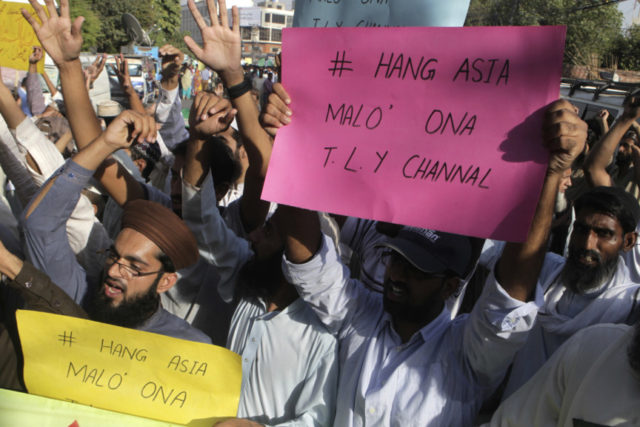Pakistan’s Supreme Court postponed its ruling on Monday on a final appeal by a Christian woman, Asia Bibi, who became the first woman to be sentenced to death in 2010 under the country’s strict blasphemy law.
On Monday, the Pakistani newspaper Dawn reported:
A special three-member bench of the Supreme Court on Monday reserved its judgment on the final appeal against the execution of Asia Bibi, a Christian woman sentenced to death for blasphemy.
Chief Justice Mian Saqib Nisar, Justice Asif Saeed Khosa and Justice Mazhar Alam Khan Miankhel were hearing Bibi’s 2014 appeal against the capital punishment handed to her.
While reserving its verdict on the appeal, the chief justice warned media against commenting on or discussing the case until the apex court’s detailed judgment has been issued. No date has been announced by the court for when the verdict will be announced.
The court’s decision to reserve judgment for now came as the Islamist Tehreek-e-Labaik Pakistan (TLP) party, which rose to prominence during the recent elections in the country by campaigning on punishing blasphemy, warned the court against any “concession or softness” for Bibi, Reuters reported.
“If there is any attempt to hand her over to a foreign country, there will be terrible consequences,” the TLP declared in a statement.
Chief Justice of Pakistan (CJP) Mian Saqib Nisar appeared to cast on the blasphemy accusation 53-year-old Bibi, a mother of five, according to Dawn.
“There is a lot of contradiction between statements given by the people [involved in this case],” the CJP acknowledged, echoing Bibi’s lawyer.
“Blasphemy is a heinous crime, [but] it remains to be seen whether the allegations [against Bibi] were proven,” the CJP later observed.
The case against the Christian mother has triggered criticism against Pakistan’s draconian blasphemy law from international rights groups and the Vatican, which has urged Islamabad to release her.
If the supreme court upholds Bibi’s conviction, her only recourse would be to make a direct appeal to the country’s leader for clemency.
Bibi could become the first person to be executed for blasphemy in Pakistan if that fails. Pakistan’s Prime Minister Imran Khan, who came into power in August, vowed to defend the country’s controversial blasphemy law.
Muslims in Pakistan often use the nation’s blasphemy law to target Christians and other religious minorities across the country, where authorities have arrested dozens of people for allegedly insulting Islam. Pakistanis have routinely abused the law to settle personal vendettas, according to human rights groups.
Depending on the nature of the offense, other punishments for blasphemy include a fine or a prison term.
Although the law can carry capital punishment and offenders have been sentenced to death, Pakistan has yet to execute anyone for committing blasphemy.
Nevertheless, extremists who take the law into their own hands have killed dozens following blasphemy claims.
Bibi’s case has stirred emotions among supporters of her innocence and those who want to see her executed.
Islamic extremists have already assassinated two politicians for trying to help Bibi, including Punjab governor Salman Taseer, killed by his own bodyguard. The TLP idolizes Taseer’s killer.
Pakistan executed the killer for murdering the governor.
In May, an extremist linked to TLP has also shot and injured Pakistan’s then-Interior Minister Ahsan Iqbal.
Pakistan has held Bibi in prison since 2009 on allegations that she defamed the prophet Muhammad, an offense that carries a mandatory death penalty under Pakistani law. Bibi denies the accusation.
In 2010, a Pakistani court sentenced Bibi to death for allegedly making “defamatory and sarcastic” comments about holy prophet Mohammad in June 2009 after neighbors objected to her drinking water from their glass because she was not Muslim.
The Lahore High Court upheld her conviction and death sentence in 2014. Pakistan’s Supreme Court admitted her appeal the following year.
On Monday, Saiful Mulook, Bibi’s lawyer, stressed that his client’s accusers have contradicted themselves.
“She simply had an argument with two women. During that argument, they exchanged harsh words,” the lawyer declared, emphasizing that the witnesses who accuse his client of blaspheming are “lying.”
Ghulam Mustafa Chaudhry, the lawyer representing complainant Qari Islam, argued that Bibi did use blasphemous language against the prophet.
“These [blasphemous statements] are the same words that Christians usually use,” he said.
“Bibi’s family has been living under constant fear since 2010,” Deutsche Welle (DW) added. “The Christian woman’s husband, Ashiq Masih, has been fighting a desperate battle for the life and freedom of his wife ever since.”

COMMENTS
Please let us know if you're having issues with commenting.